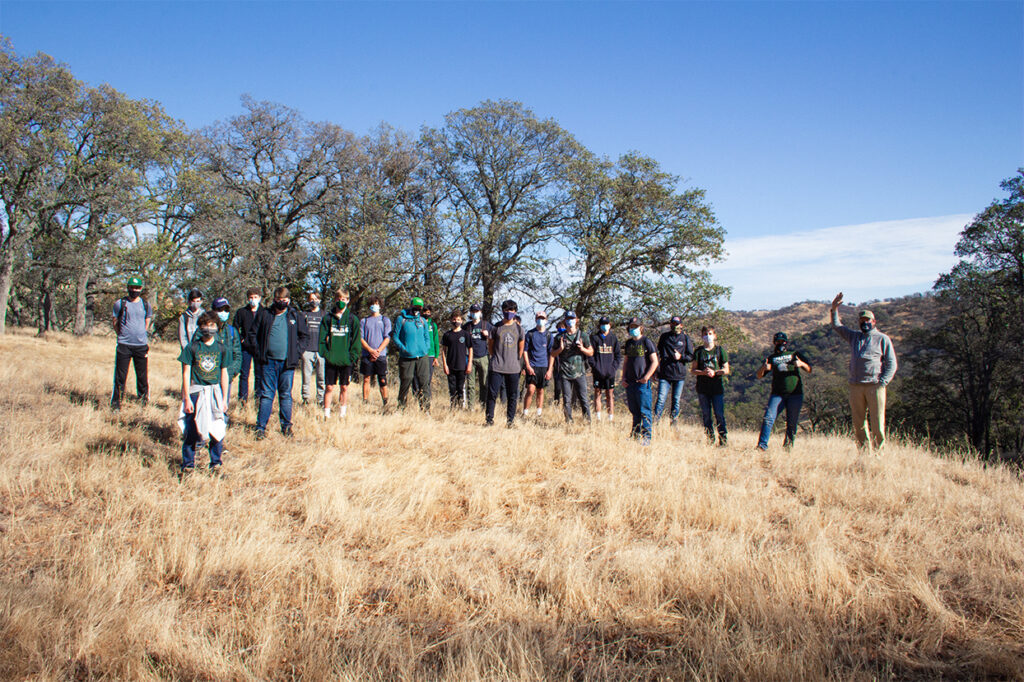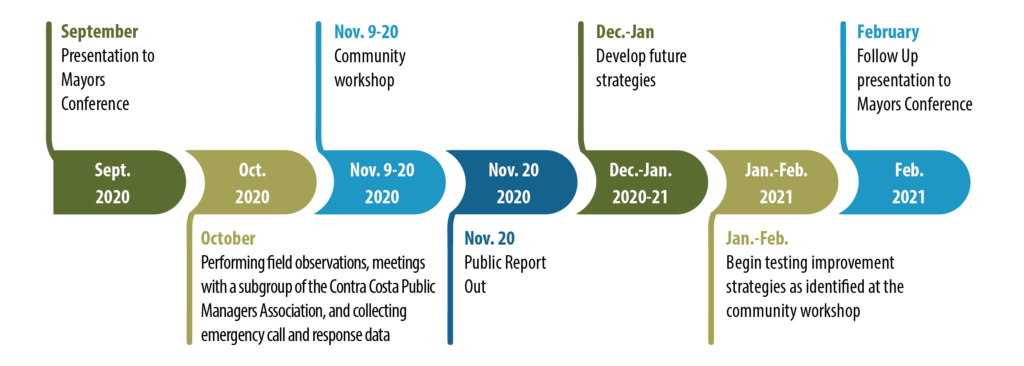Struck by 49-year-old male driver from Brentwood
By CHP – Contra Costa
Early this morning at about 3:45am, Contra Costa CHP was advised of a two-vehicle crash on Vasco Road, south of Walnut Blvd. Upon emergency personnel and CHP arrival, it was determined that a 2008 Chevrolet HHR was traveling northbound on Vasco Road and began a turning movement, crossing over the solid double yellow lines and into the southbound lane. As the Chevrolet entered into the southbound lane, it was directly in the path of an oncoming vehicle, a 2015 Ford F-150. The driver of the Ford, a 49-year-old male from Brentwood, was unable to avoid the HHR within the lane and collided into it, causing major damage to both vehicles. Tragically the driver of the Chevrolet, a 19-year-old male from Antioch, was pronounced deceased at the scene.
The driver of the Ford suffered moderate injuries and was transported to John Muir Hospital in Walnut Creek. The Contra Costa County Sheriff-Coroner’s Office will be handling the release of identity of the deceased driver.
It is unknown at this time if alcohol or drugs were a factor in this collision, but it is still under investigation. If anyone witnessed this collision or the events leading up to it and have not yet spoken with CHP, please contact Contra Costa CHP in Martinez, (925) 646-4980.
Read MoreBy CHP – Contra Costa
Last night at about 11:33pm, Contra Costa CHP was advised of a solo vehicle crash on State Route 242 northbound, at Hwy 4. Upon emergency personnel and CHP arrival, it was determined that a solo, black 1994 Honda Civic had veered from the lanes of traffic of SR-242 northbound and collided into the concrete center divider. The driver then lost control of the vehicle as it tumbled over the center divider and down the center dirt embankment towards the southbound lanes of SR-242. The vehicle landed on its roof and came to rest within the southbound lanes of SR-242.
The driver, a 22-year-old male from Concord, was restrained and sustained only minor injuries. The male passenger, an adult male from Pittsburg, was not properly restrained and subsequently ejected from the vehicle and onto the roadway of SR-242 southbound and struck by a passing vehicle. He was pronounced deceased at the scene. The Contra Costa County Sheriff’s Coroner’s Office will be handling the release of the deceased passenger’s identity.
Alcohol or drugs are not considered a factor in this collision, but it is still under investigation. If anyone witnessed this collision or the events leading up to it and have not yet spoken with CHP, please contact Contra Costa CHP in Martinez, (925) 646-4980.
Read MoreCommemorative Pictorial Postmark Announced
By Laura Kindsvater, Communications Manager, Save Mount Diablo
This December 7th, National Pearl Harbor Remembrance Day, three local survivors of World War II’s “Day of Infamy”—the attack on Pearl Harbor in 1941—will share their stories as part of a virtual ceremony filmed primarily atop Mount Diablo.
Sponsors of the yearly event, including local land trust Save Mount Diablo, California State Parks, Sons and Daughters of Pearl Harbor Survivors Chapter 5, and California State University– East Bay, are proud to present a virtual celebration this year beginning at 4:30 p.m. Pacific Standard Time on Monday, December 7th.
In a 45-minute video, three local East Bay survivors of the Pearl Harbor attack will recount their experiences that fateful day. Speakers will then pay tribute to those who sacrificed their lives and honor those yet living, “Lest We Forget” the tragedy that befell the country nearly six decades ago and the way we came together after the attack.
Three Pearl Harbor survivors and the crowd celebrating the Beacon being lit and looking up to the Summit of Mount Diablo from the California State University–East Bay Concord Campus on December 7, 2018. Photo by Richard Usinger.
“When that beacon light is turned on, that’s a tribute to those individuals who lost their lives at Pearl Harbor,” said Pearl Harbor survivor Earl “Chuck” Kohler from Concord.
Save Mount Diablo’s Executive Director Ted Clement noted, “This year it is especially important that we come together as a nation to honor National Pearl Harbor Remembrance Day and those who served. Reflecting on that day and the aftermath reminds us of the strength of our nation when we come together even amidst great adversity. Our December 7th virtual event will enable more people to come together on this important day.”
Eddie Guaracha, California State Parks Diablo Range District Superintendent, stated, “As we reflect on this historic event, it is not only critical to remember the many lives that were lost, but also to remember the selfless acts undertaken by many on this fateful day. This is the spirit of our country in critical times. It is an honor to represent California State Parks on this momentous occasion, and I hope we can all remember to radiate kindness toward one another, as we remember those who gave all on this day.”
“As we pass through difficult, often divisive times ourselves, the sacrifices borne by the American people following that fateful morning some 79 years ago should give us all an enormous sense of pride, and most importantly, hope for the future. Cal State East Bay is honored to once again participate in this annual act of remembrance,” said Robert Phelps, Director of the California State University–East Bay (Concord Campus).
The U.S. Postal Service, in commemoration of this year’s National Pearl Harbor Remembrance Day, is issuing a special pictorial postmark. The postmark can be obtained by following the instructions here.
Those interested in witnessing this year’s virtual Pearl Harbor Remembrance Day Ceremony can find the video link on Save Mount Diablo’s home page at 4:30 PM on December 7th at www.savemountdiablo.org.
Background
Every year since 1964, the Pearl Harbor survivors and their families have memorialized Pearl Harbor Day by relighting the historic Beacon atop Mount Diablo’s summit.
The Beacon was originally lit by Charles Lindbergh in 1928 to assist in the early days of commercial aviation. The Beacon shone from the summit of Mount Diablo each night until December 8, 1941, the day after the attack on Pearl Harbor.
It was not relit until December 7, 1964, when Fleet Admiral Chester Nimitz, Commander in Chief of Pacific Forces during World War II, attended a ceremony on Mount Diablo’s summit in commemoration of the survivors of Pearl Harbor. He suggested that the Beacon be lit every December 7th to honor those who served and sacrificed.
Save Mount Diablo, California State Parks, the Sons and Daughters of Pearl Harbor Survivors Chapter 5, California State University–East Bay (Concord Campus), and others organize the annual lighting ceremony of the Beacon every December 7th in honor of the National Pearl Harbor Remembrance Day.
One of the bright lights provided to the San Francisco Bay Area during this pandemic is the Mount Diablo Beacon, which Save Mount Diablo staff and volunteers light every Sunday night after sunset so that the Beacon can shine brightly through the darkness until it is rested after sunrise on Monday.
Save Mount Diablo’s lighting of the Beacon every week is a way to thank our heroes in these troubling times, to help our communities come together, and to remind people to lift their eyes to the light and nature.
Save Mount Diablo began this weekly lighting of the Beacon on Sunday, April 12th, Easter Sunday. However, the Beacon will not be lit on Sunday, November 29th and Sunday, December 6th to build anticipation for and honor the coming National Pearl Harbor Remembrance Day. After the December 7th ceremonial lighting of the Beacon, Save Mount Diablo will resume the weekly lighting of the Beacon for as long as the pandemic rages here.
Commemorative Pictorial Postmark Announced
As a community service, the U.S. Postal Service™ offers pictorial postmarks to commemorate local events celebrated in communities throughout the nation.
Those who wish to obtain the postmark may submit a mail order request. Requests must be postmarked no later than 30 days following the requested pictorial postmark date.
All requests must include a stamped envelope or postcard bearing at least the minimum First-Class Mail® postage. Items submitted for postmark may not include postage issued after the date of the requested postmark. Such items will be returned unserviced.
Customers wishing to obtain a postmark must affix stamps to any envelope or postcard of their choice, address the envelope or postcard to themselves or others, insert a card of postcard thickness in envelopes for sturdiness, and tuck in the flap. Place the envelope or postcard in a larger envelope and address it to: Pictorial Postmarks, followed by the Name of the Station, Address, City, State, ZIP+4® Code, as listed next to the postmark.
Customers can also send stamped envelopes and postcards without addresses for postmark, as long as they supply a larger envelope with adequate postage and their return address. After applying the pictorial postmark, the Postal Service returns the items (with or without addresses) under addressed protective cover.
About Sons and Daughters of Pearl Harbor Survivors
It is the mission of the SDPHS to create programs that inspire youth and adults to learn and document the history of the beginning of WWII and the days that followed from people who experienced it and from their ancestors. Learn more at www.sdphs.org.
About Save Mount Diablo
SMD is a nationally accredited, nonprofit land trust founded in 1971 with a mission to preserve Mount Diablo’s peaks, surrounding foothills, and watersheds through land acquisition and preservation strategies designed to protect the mountain’s natural beauty, biological diversity, and historic and agricultural heritage; enhance our area’s quality of life; and provide recreational opportunities consistent with the protection of natural resources. Learn more at www.savemountdiablo.org.
About California State Parks
To provide for the health, inspiration, and education of the people of California by helping to preserve the state’s extraordinary biological diversity, protecting its most valued natural and cultural resources, and creating opportunities for high-quality outdoor recreation. Learn more at www.parks.ca.gov.
About California State University–East Bay
Cal State East Bay welcomes and supports a diverse student body with academically rich, culturally relevant learning experiences that prepare students to apply their education to meaningful lifework, and to be socially responsible contributors to society. Through its educational programs and activities, the university strives to meet the educational needs and to contribute to the vitality of the East Bay, the state, the nation, and global communities. Learn more at www.csueastbay.edu.
Read MorePROCLAMATIONS
The White House
Proclamation on Thanksgiving Day, 2020
Issued on: November 25, 2020
On Thanksgiving Day, we thank God for the abundant blessings in our lives. As we gather with family and friends to celebrate this season of generosity, hope, and gratitude, we commemorate America’s founding traditions of faith, family, and friendship, and give thanks for the principles of freedom, liberty, and democracy that make our country exceptional in the history of the world.
This November marks 400 years since the Mayflower and its passengers faced the unknown and set sail across the Atlantic Ocean. Propelled by hope for a brighter future, these intrepid men and women endured two long months at sea, tired and hungry, to arrive in a new world full of potential. In the winter weather that greeted their arrival, they lost nearly half of their fellow travelers to exposure, disease, and starvation. Despite unimaginable hardships, these first Americans nevertheless remained firm in their faith and unwavering in their commitment to their dreams. They forged friendships with the Wampanoag Tribe, fostered a spirit of common purpose among themselves, and trusted in God to provide for them. The following year, they celebrated a successful harvest alongside their Native American neighbors — the first Thanksgiving. This seminal event in the history of our Nation is a continual reminder of the power of faith, love, perseverance, prayer, and fellowship.
The Mayflower’s arrival to the New World in 1620 also marks the arrival of the first seeds of democracy to our land. Absent the rule of a monarch in an uncharted wilderness, these early settlers resolved to create their own government through what is known as the Mayflower Compact. Defined by majority rule through elected leaders responsible for creating “just and equal laws,” the Mayflower Compact represents the first chapter in the long tradition of self-determination and rule of law in America. One hundred and fifty-six years later, our Nation’s Founding Fathers resolved to break free from England, building upon the Mayflower Compact to establish an enduring government whose authority came solely “from the consent of the governed.”
This year, as our Nation continues to combat the coronavirus pandemic, we have once again joined together to overcome the challenges facing us. In the midst of suffering and loss, we are witnessing the remarkable courage and boundless generosity of the American people as they come to the aid of those in need, reflecting the spirit of those first settlers who worked together to meet the needs of their community. First responders, medical professionals, essential workers, neighbors, and countless other patriots have served and sacrificed for their fellow Americans, and the prayers of our people have once again lifted up our Nation, providing comfort, healing, and strength during times of uncertainty. Despite unprecedented challenges, we have not faltered in the face of adversity. To the contrary, we have leveraged our strengths to make significant breakthroughs that will end this crisis, rebuilding our stockpiles, revamping our manufacturing capabilities, and developing groundbreaking therapeutics and life-saving vaccines on record-shattering timeframes.
During this season of gratitude, we also acknowledge those who cannot be with their families. This includes the brave American patriots of our Armed Forces who selflessly defend our sacred liberty at home and abroad. And we pause to remember the sacrifices of our law enforcement personnel and first responders. We are deeply grateful for all those who remain on watch over the holidays and keep us safe as we celebrate and give thanks for the blessings in our lives.
This Thanksgiving, we reaffirm our everlasting gratitude for all that we enjoy, and we commemorate the legacy of generosity bestowed upon us by our forbearers. Although challenges remain, we will never yield in our quest to live up to the promise of our heritage. As we gather with our loved ones, we resolve with abiding faith and patriotism to celebrate the joys of freedom and cherish the hope and peace of a brighter future ahead.
NOW, THEREFORE, I, DONALD J. TRUMP, President of the United States of America, by virtue of the authority vested in me by the Constitution and the laws of the United States, do hereby proclaim Thursday, November 26, 2020, as a National Day of Thanksgiving. I encourage all Americans to gather, in homes and places of worship, to offer a prayer of thanks to God for our many blessings.
IN WITNESS WHEREOF, I have hereunto set my hand this twenty-fifth day of November, in the year of our Lord two thousand twenty, and of the Independence of the United States of America the two hundred and forty-fifth.
DONALD J. TRUMP
Read MoreMy name is Khalid Khan, serving as Imam of Ahmadiyya Muslim Community in the Bay Area. I reside in Bay Point. Please find below my letter regarding Thanksgiving.
“On Thursday, millions of Americans will celebrate Thanksgiving—a day of reflection and thankfulness for all that we have. As Ahmadi Muslims we are thankful to God for living in America and having the rights to exercise religious freedom and all the things he has provided for us. Allah says in the Holy Quran that “Surely, Allah is gracious towards mankind, but most of them are not thankful” (10:61). The Holy Prophet (saw) has also stated that, “One who is not thankful to people, is not thankful to Allah.”
Even though many families might not be traveling this year because of the pandemic to be with their loved ones during this holiday, nonetheless, we should be grateful that our loved ones are safe and sound. May God keep everyone safe during this holiday season. Happy Thanksgiving to everyone.
Thanks,
Imam Khalid Khan
Bay Point
Read More
By Jamie Coffee, Information Officer II, California Highway Patrol
 SACRAMENTO, Calif. – As Californians plan for the Thanksgiving holiday during the ongoing pandemic, the California Highway Patrol (CHP) reminds everyone the rules of driving safety are just as crucial as ever.
SACRAMENTO, Calif. – As Californians plan for the Thanksgiving holiday during the ongoing pandemic, the California Highway Patrol (CHP) reminds everyone the rules of driving safety are just as crucial as ever.
To encourage safe travel, the CHP will enact a Maximum Enforcement Period (MEP) beginning at 6:01 p.m. on Wednesday, November 25, and continuing through 11:59 p.m. on Sunday, November 29. During the MEP, CHP officers will be actively looking for unsafe driving practices as well as helping motorists in need.
“This year has presented us with many unforeseen challenges, but safety is still our priority,” CHP Commissioner Amanda Ray said. “If you choose to travel this Thanksgiving weekend, our goal is to help motorists arrive at their destination without incident.”
Thanksgiving weekend is traditionally one of the busiest travel times of the year. Because of the COVID-19 pandemic, traffic may be a bit lighter, but this is not an invitation to speed to your destination. The rules of the road still apply, and motorists should avoid driving tired, impaired, or distracted. Additionally, in an effort to reduce COVID-19 transmission, Governor Gavin Newsom has instituted a limited stay at home order from 10 p.m. to 5 a.m. and a travel advisory, encouraging people to only go about essential activities during those hours and to self-quarantine for 14 days if they are arriving from another state or country.
Those who must be on the road, remember to buckle up. Proper seat belt use is the single most effective way to save a life in the event of a crash. When you are traveling for the holiday, or any time of the year, make sure everyone in the vehicle is safely secured before even starting the car, and that includes children being in the correct child safety seats.
During the 2019 Thanksgiving MEP, 42 people died on California roadways. Of the 27 who died within CHP jurisdiction, 11 were not wearing seat belts. The CHP also made 867 arrests for driving under the influence of alcohol or drugs.
The mission of the CHP is to provide the highest level of Safety, Service, and Security.
Read More
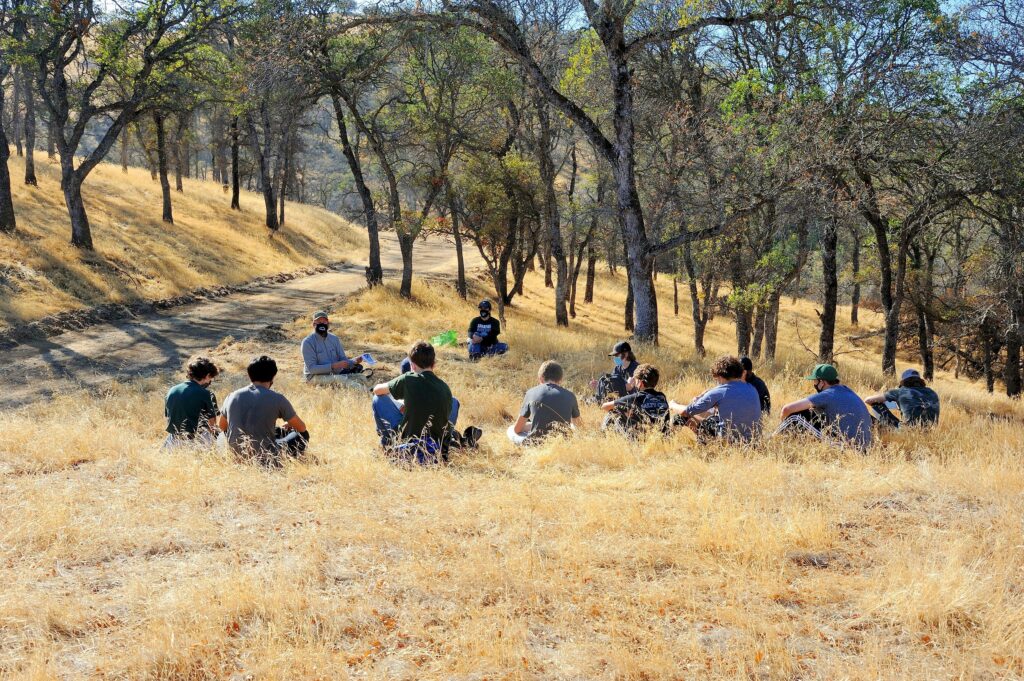
De La Salle students gather with Save Mount Diablo Executive Director Ted Clement at SMD’s Big Bend property east of Clayton to prepare for their solo experiences in nature. Photo by Al Johnson.
De La Salle High School students team up with Save Mount Diablo to learn about nature while staying safe during the pandemic
By Laura Kindsvater, Communications Manager, Save Mount Diablo
De La Salle High School students, eager to get outdoors, leapt at the chance to be part of Save Mount Diablo’s newly revised, hands-on Conservation Collaboration Agreement program designed to connect young people to nature while keeping them safe during the pandemic. “Students are geniuses at adapting,” said Ted Clement, Executive Director of Save Mount Diablo (SMD). “When we had to change the way we deliver our experiential Conservation Collaboration Agreement (CCA) education program, they and their teachers took up the challenge and are making it work.”
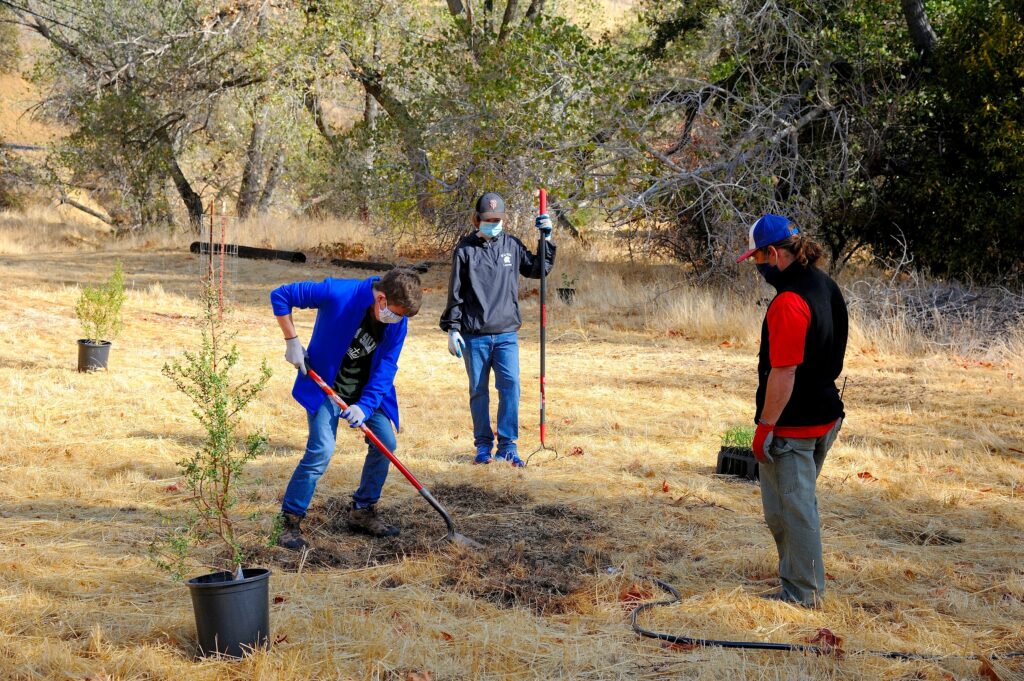
Two De La Salle students breaking ground to plant some native coyote brush as part of restoring Save Mount Diablo’s Big Bend property during an environmental service project. Photo by Al Johnson.
De La Salle High School is not new to the CCA program. An earlier class took part in 2018, when the program’s traditional three-part format was in place. Then, students learned basic information during classroom presentations by SMD staff and, on a separate day in the field, completed a hands-on stewardship project along with a hike, a presentation by an environmental educator, and a solo journaling experience. The impact was powerful: Students’ knowledge and intentions to spend more time outdoors skyrocketed.
Now SMD has moved presentations to a Zoom platform, and outdoors activities take place with social distancing and masks. Plus, students can opt for self-directed outdoors projects under the guidance of SMD and their teacher instead of gathering with their classmates. The question is: Will the new format be as effective?
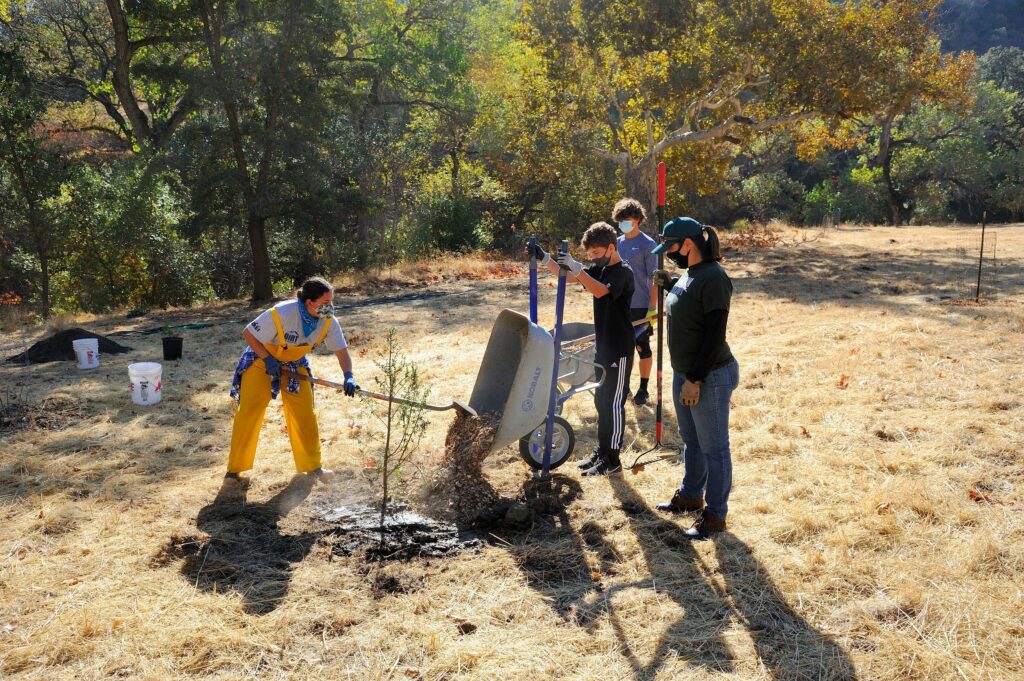
Save Mount Diablo Land Stewardship Manager Roxana Lucero pulls mulch out of a wheelbarrow as De La Salle students and Honors Biology Teacher Henriette Howett prepare to rake it around a newly planted native coyote brush shrub. Photo by Al Johnson.
So far, yes. This year’s class – a total of 54 Honors Biology students – is jumping right in to the new CCA format. After two initial Zoom presentations, the class spent a day outdoors – a group of 21 completed a restoration project on Save Mount Diablo’s Big Bend property, and 33 created their own hands-on nature service projects. Save Mount Diablo gave these 33 students a list of project ideas, such as creating art from trash, cleaning up their neighborhoods, planting native plants in their gardens, removing invasive weeds with landowners’ permission, and reducing energy usage in their homes.
Wearing masks and distancing themselves socially, the group of 21 worked hard to restore habitat at Save Mount Diablo’s Big Bend property, planting yarrow, coyote bush, Pacific blackberry, and California rose. They also potted up blue oak acorns for planting next year. The 33 students who completed the program as an independent study project will report on their experience in the class’s upcoming, and final, Zoom meetings today and tomorrow.
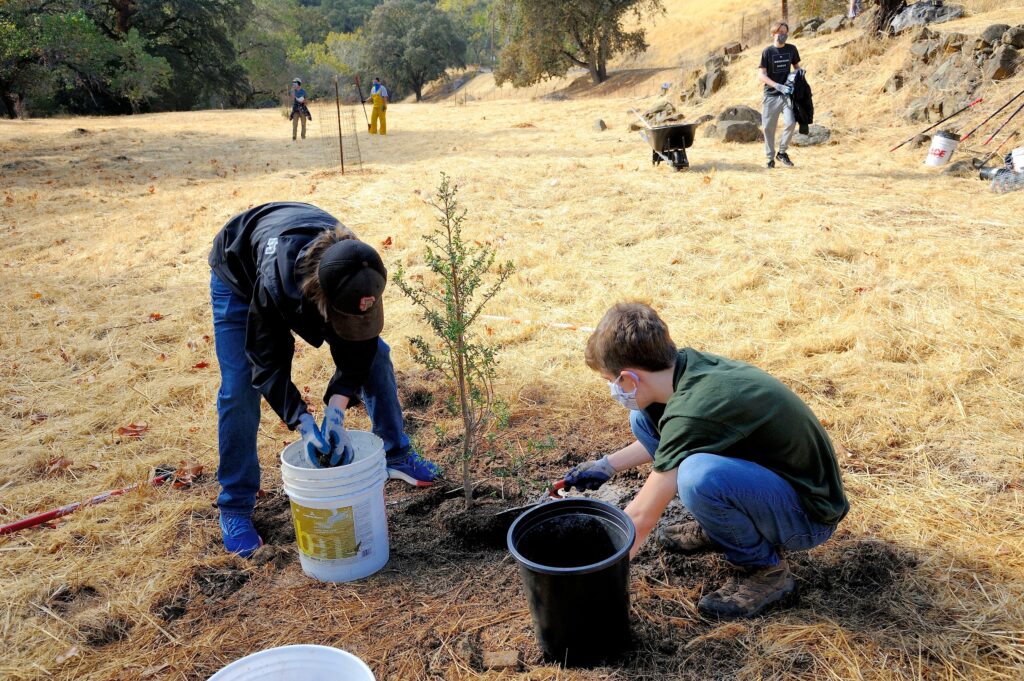
Two De La Salle students planting some native coyote brush on November 14 at Save Mount Diablo’s Big Bend property in the Marsh Creek watershed. Photo by Al Johnson.
“On Saturday, November 14th, 2020, I was fortunate to take 21 of my Honors Biology students on a field trip to work on a Conservation Collaboration Agreement with Save Mount Diablo. This is my second year doing a CCA and it was a wonderful experience. I’m currently teaching remotely, so this was the first time for me to see my students in person. As always, it was so nice to be out in nature, but more so now because of the pandemic. Many students are feeling isolated being home in front of the computer all day long for virtual meetings. I’ve been encouraging them to go out for hikes and to get some fresh air, but it was nice to have the experience together. My favorite part of the day was the solo in nature. I watched eagerly as 10 of my students walked up the oak-covered hillside and selected a tree to sit by. They reflected on their prompts about nature, as did I. In this busy time where all the days seem to drag together, day after day, it was a meaningful experience to sit and slow down. I’m so grateful to have had this opportunity with my students and the Save Mount Diablo staff,” stated Henriette Howett, De La Salle High School Honors Biology Teacher.

A De La Salle student contemplating nature amid a forest of blue oak trees during the solo part of the field experience. Photo by Al Johnson.
This enthusiasm is important because youth today, “spend less time outside than prison inmates, with the average child playing freely outside for just four to seven minutes a day,” according to a 2017 report commissioned by REI Co-op, The Path Ahead. This report notes that the average American now spends about 95 percent of their life indoors. It further reports that we are becoming an “indoor species,” which comes with consequences: “Our health and well-being may suffer. And the less we value our outdoor spaces, the less likely we are to protect them.”
Clement considers De La Salle one of the CCA program’s benchmark participants. “It’s clear that De La Salle students embrace new challenges, and their teachers support them every step of the way,” he noted. “Having this group use our new CCA format, so we can continue to connect kids to nature during the pandemic, is a privilege and will pave the way for other classes to be successful.” He continued, “Save Mount Diablo thanks De La Salle High School for its commitment to getting young people connected to the beautiful Mount Diablo natural areas through our Conservation Collaboration Agreement program. This type of leadership is directly addressing the disturbing trend of ‘nature deficit disorder’ in our modern culture.”
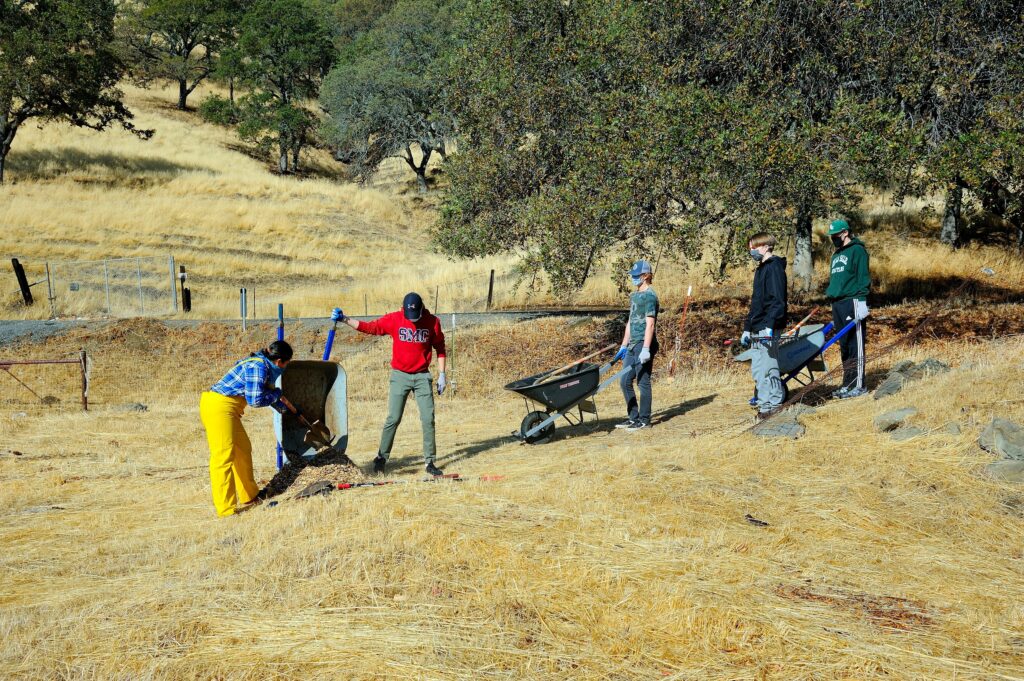
De La Salle students work with Save Mount Diablo Land Stewardship Manager Roxana Lucero to gather mulch for native planting sites. Photo by Al Johnson.
In the final portion of the CCA program, designed to engage students in educational and participatory philanthropy, the class will work to raise funds to become members of SMD through SMD’s discounted youth membership program.
About Save Mount Diablo
SMD is a nationally accredited, nonprofit land trust founded in 1971 with a mission to preserve Mount Diablo’s peaks, surrounding foothills, and watersheds through land acquisition and preservation strategies designed to protect the mountain’s natural beauty, biological diversity, and historic and agricultural heritage; enhance our area’s quality of life; and provide recreational opportunities consistent with the protection of natural resources. Learn more at www.savemountdiablo.org.
About De La Salle High School
De La Salle High School is a private Roman Catholic school for boys in Concord, California. The school was founded in 1965. De La Salle currently enrolls 1,039 students, and roughly 99 percent of each graduating class goes on to attend a university or college. Learn more at www.dlshs.org.
For other photos, please credit photographer in image file name. For video files, please credit Floyd McCluhan.
Read More
Contra Costa kids and families will have the opportunity to have a safe and socially distant Thanksgiving food drive-thru with local community members.
Moose Lodge 550 – With the holiday season approaching Boys & Girls Clubs of Contra Costa decided to host a Thanksgiving drive-thru event. On Tuesday November 24, 2020, Boys & Girls Clubs of Contra Costa will be taking over the Moose Lodge 550 parking lot and making it a family friendly drive-up Thanksgiving meal and backpack giveaway in a socially distant way! The event is a drive-thru event ONLY and will open to Contra Costa County families from 3:00 to 5:00 pm.
“We know times are tough right now for families throughout Contra Costa. Boys & Girls Clubs of Contra Costa is committed to doing whatever it takes to support kids and families,” said Keirstan Faulkner, Director of Education of the Boys & Girls Clubs of Contra Costa.
Our Thanksgiving event will include packages of turkey’s, mashed potatoes, vegetables, mac & cheese, bread, and some fun additional snacks! Families must drive in and remain in the car as they come to pick up their food.
Extra precautions have been put in place by Boys & Girls Clubs of Contra Costa to help ensure the health and safety of all guests wishing to participate in this year’s Thanksgiving Celebration.
If you are interested in participating or donating any food or supplies, please contact Keirstan Faulkner via email at kfaulker@bgccontracosta.org. Any monetary donations to the organization will go towards our COVID-19 relief fund so we can continue to support our community when they need us the most.
Thanksgiving Holiday Food Giveaway with Boys & Girls Clubs of Contra Costa is scheduled for Tuesday November 24th from 3pm to 5 PM PST.
Event Details:
What: Thanksgiving Holiday food giveaway with Boys & Girls Clubs of Contra Costa
When: Tuesday, November 24th, 2020
Where: Moose Lodge 550 at 4674 Appian Way, El Sobrante
For any additional information, please contact us at kfaulkner@bgccontracosta.org
We believe every kid has what it takes to be happy and successful. The mission and core beliefs of Boys & Girls Clubs fuel our commitment to promoting safe, positive and inclusive environments for all. For more information, please visit and get involved at https://www.bgccontracosta.org
Read MoreShe was the wife of a famous attorney; writer claims neighbor was falsely accused and wrongly convicted, case should be investigated by DA’s Conviction Integrity Unit
Fifteen years ago, Lafayette resident Pamela Vitale was repeatedly and savagely bludgeoned, and stabbed numerous times within her home by those responsible for her violent death. I believe, and am of the opinion, that it was an incomplete, flawed, inadequate, and unfortunately misdirected investigation(s), initial defenses and prosecution. In the investigations’ haste the neighborhood’s poor teenager, Scott Dyleski, was quickly and questionably focused on as being the responsible party, to the exclusion of any others, even though law enforcement’s own leads and evidence suggested someone else, perhaps even two others, was/were responsible for her brutal death.
Vitale was the wife of famed attorney David Horowitz and friend of television host and legal commentator, Nancy Grace, who ran an episode about the case during a TV show, last year. Horowitz was an early suspect in the murder.
It is my opinion and belief that this murder case, with some notoriety involved, was where much investigative evidence was ignored and/or discounted in order to quickly bring someone forward as the responsible before the numerous news media and press that had pounced on the case. Scott Dyleski unfortunately was brought before the public and prosecuted as the responsible!
Years ago, I was hired by Scott Dyleski’s two appeals attorneys for the purposes of assisting them in their representation of Scott Dyleski’s conviction appeals and defense. it was my impression then, and still is, that the killing of Pamela Vitale was a personal rage type of murder by one who closely interacted with and knew her.
This very brief summary position is of my case analysis, evidence, investigation, opinion and beliefs, concerning the then investigations, defense and prosecution of the quickly suspected, accused, and I believe wrongly convicted Scott Dyleski in the vicious murder of Pamela Vitale. Scott Dyleski has been incarcerated for 15 years for a crime that he is seriously believed to NOT have committed, with the responsible(s) having yet to be clearly identified by law enforcement, held accountable, or brought to justice.
There’s so much that the case suggests and points to as to the sequence of events that fateful day. One significant part is, I truly believe, based upon the information and evidence, that the brutal victimization of Pamela Vitale was not a single continuation of events. No, the evidence points to there having been separate phases that ultimately led to her violent and savage unwarranted death. This I say with my own 50-plus years of hands-on public safety investigative training and experiences, which includes numerous Homicide investigations. I have been a state certified Homicide Investigator since 1980.
The Contra Costa County District Attorney’s Office reported in June 2019 that it had established the Conviction Integrity Unit to review cases where it’s suspected that someone may have been convicted of a crime that they did not commit. I quickly submitted a request in writing to the D.A.’s unit and to the Public Defender’s Office over a year ago. I haven’t heard from them since. This case definitely cries out for such reopening and renewed investigation of the case, including both the defense’s and prosecution’s involvements. I believe, and am of the opinion, that it was a serious injustice and unfortunately misdirected case investigation(s), his defense and prosecution.
It is my opinion and belief that this case cries out for a full and proper reopening and re-investigation of the case, including the activities of the police, the defense’s and the prosecution’s involvements. Not only is Scott Dyleski the loser in all of this but so is the foundation of our society wherein we all are entitled to a just and equal expectation of a fair, complete, and unbiased administration of Justice. Pamela Vitale’s death and Scott Dyleski deserve real Justice!
Your assistance in demanding such from the D.A.’s Office and Public Defender’s Office is more than warranted. Fifteen years of Scott’s young life has already been denied him and he still faces many more if this very serious matter is again just ignored by all. Her murder deserves that the whole truth is determined, not ignored! And those really responsible should be brought to justice!
Ralph A. Hernandez
Antioch
Read More
To connect residents with the most appropriate resources
Working in partnership with cities across Contra Costa County, Contra Costa Health Services (CCHS) has launched a comprehensive review of existing behavioral health crisis response services to develop a vision for how to connect residents with the most appropriate resources where and when they are needed.
In close collaboration with city leaders through the Contra Costa Public Managers Association, community stakeholders, service providers and staff from across the county participated in a multi-day workshop to identify current resources and next steps. Workshop participants included those working in crisis response, community-based organizations, schools, police and dispatch, as well as clinicians and persons and family members with lived experiences. The team spent the past two weeks observing, analyzing and interviewing subject matter experts and looking at data about the current state of crisis response in Contra Costa County to develop a vision for the future and identify areas for improvement.
Statistics
- Behavioral health issues are widespread
- About one in five adults are currently experiencing behavioral health issues
- About 13% of all EMS calls address mental health issues
- There are between 10,000 and 11,000 involuntary psychiatric holds (5150s) in our county each year
Existing Resources
- CCHS provides a variety of behavioral health services. A limited number provide crisis response, however none provide emergent response like 911.
- Crisis Intervention Training (CIT)
- Homeless Services (H3 & HCH)
- Alcohol & Other Drug Services
- Medical and Psychiatric Emergency Services
- Behavioral Health Crisis Teams
- Existing crisis response resources serve a small number of residents
- Mental Health Evaluation Team (MHET) serves 293 people annually at a cost of $2 million
- Designed to reduce law enforcement repeat calls for service and violent encounters, reduce visits to Psychiatric Emergency Services, increase community and police safety, and increase appropriate use of mental health services.
- Mobile Crisis Team (MCRT) takes about 1,600 calls per year at a cost of $2 million, serves adults only
- MCRT is designed to have mental health providers respond in the field to de-escalate crisis, provide stabilization, and prevent psychiatric hospitalization. If the situation cannot be de-escalated in the field, the MCRT will assess for 5150 criteria and, if criteria are met, the Mental Health Clinical Specialist can initiate a 72-hour 5150 involuntary hold.
- In addition to responding in the community to the immediate situation that led to calling the MCRT, the team provides a 30-day period of follow up during which they focus on linking individuals to a variety of services to help them stabilize and prevent ongoing crisis experiences.
- Mobile Response Team (MRT) receives about 1,000 calls from youth each year, budget is $2.2 million
- Mental Health Evaluation Team (MHET) serves 293 people annually at a cost of $2 million
- MRT provides risk/safety assessments, crisis intervention, follow up services, collaboration with existing treatment team members and linkage for youth in their natural settings. The CCC MRT aims to provide same day services and/or services as close to 24 hours of immediate crisis.
- We have researched models from other communities
- Regardless of what model we choose, the key to success is alignment with our cities and community partners across the county.
The public is invited to hear the key findings and recommendations during a public report to be shown on Contra Costa Television (CCTV) on Saturday, November 21 at noon and 7 p.m., and Sunday, November 22 at 9 a.m. and 6 p.m. The event can also be seen online at contracostatv.org during those scheduled times.
The process prioritized these areas of focus for the next steps:
- Identifying a single number to call for behavioral health crisis response
- Establishing a mobile crisis 24/7 response
- Evaluating non-police mobile crisis team composition
- Identifying alternate destinations for those experiencing a behavioral health crisis
Using the Lean Process Improvement Model, the team will spend the next several months planning for rapid improvement workshops to test potential strategies based on the four areas of focus. Results of this process will be presented to the Contra Costa Mayors Conference in February 2021.
For more information on CCHS Community Crisis Response, visit cchealth.org/bhs/crisis-response.
Read More








